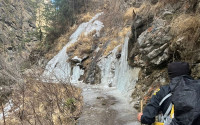National
Government panel to collect details of Nepali workers stuck abroad
There is no immediate plan to evacuate the stranded workers, officials say.
Chandan Kumar Mandal
In a bid to provide assistance to Nepali migrant workers affected by the Covid-19 pandemic and related restrictions in various countries, the government has decided to collect information on their current conditions.
Thousands of homebound Nepali migrant workers remain stuck in various countries for nearly three weeks after Nepal suspended international flights from May 7 in its attempt to stem the spread of Covid-19.
The government last week formed a seven-member task force, led by a joint secretary of the Ministry of Labour, Employment and Social Security. Other members of the task force include the director general of the Department of Foreign Employment, executive director of the Foreign Employment Board, joint secretary of the Tourism Ministry, joint secretary of the Ministry of Foreign Affairs, a representative of recruiting agencies, and an under-secretary of the Labour Ministry, who is also member-secretary of the committee.
“The committee has been formed to provide a quick response if Nepalis living in labour destination countries need any kind of help,” Rajan Prasad Shrestha, a member of the committee, told the Post. “As we have seen that the second wave of the pandemic is raging here in Nepal, if a similar situation arises in labour destination countries then there has to be a mechanism on standby for efficient response and coordination. Therefore, the committee has been formed for helping the Nepalis abroad.”
According to a preliminary study of the Foreign Employment Board, nearly 280,000 Nepalis have already lost their jobs since the pandemic hit the labour destination countries and they want to come home. Similarly, about 700 Nepali workers need to return home every day from various labour destination countries after the expiry of their work contracts, according to an estimation by the board based on last year’s repatriation experience.
“For now, the committee has decided to collect details of Nepalis in difficulty by contacting Nepali missions in labour destination countries,” said Shrestha, who is also the executive director with the Board. “The Foreign Ministry will facilitate the collection of information on the conditions of Nepali workers and foreign missions will be sending back reports.”
Besides, the committee has also decided to collect stranded workers’ grievances through the government’s call centres and social media and provide all possible support. The Labour Ministry runs a dedicated call centre for migrant workers. The call center can be contacted by dialling 1141.
“We have been receiving calls from workers who want to return home as their work contracts have expired. Likewise, families have been making calls for repatriation of workers, who remain stuck or are sick or have died abroad,” said Shrestha. “However, this time the number of such calls are fewer compared to last year.”
Although the impact of the pandemic on Nepali migrants has been comparatively less than last year when thousands of workers wanted to return home fearing infection after most of the world imposed restrictions and lockdowns.
The government has so far not announced any plans to evacuate the stranded workers.
“If anyone has died or is in extreme difficulty, we receive the information through the Nepali missions. If there are chartered flights or special flights meant for bringing medical supplies to Nepal, then people in difficulty can be accommodated on such flights,” said Dipak Kafle, a spokesperson for the Labour Ministry. “However, it is not possible to repatriate thousands of workers by chartered flights.”




 11.84°C Kathmandu
11.84°C Kathmandu













